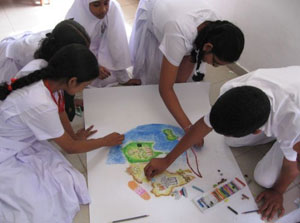They spoke on endangered species, recycling, waste management and zero carbon food.
They presented case studies on various subjects relating to climate change, globalization, sustainable development and interdependence.
But, this was not all.
The Student Conference organized by British Council (School Links and science staff) held in Galle on February 1 was, as the participants (both teachers and students) put it, a great learning experience.
The conference was a follow-up to the British Council teachers' conference on science and environment held in August last year, mainly for secondary level (grade 7 to 11) science teachers as part of the DFID Global School Partnerships (DGSP) programme that supports partnerships between schools in the UK and schools in Africa, Asia, Latin America and the Caribbean.
To carry on the work, teachers were requested to carry out a science and/or environment project based on their curriculum with their students. They were given a few months to work on the projects after which they were invited to present their projects/case studies at a student conference.
A total of 80 students representing 20 schools participated at the three-day conference where their projects/case studies were judged and winners chosen. The schools selected were part of DGSP and included Ananda College, Colombo, Beliatta Central College, Beliatta, Bishop's College, Colombo, D. S. Senanayake College, Colombo, Dankotuwa Girls' College, Dankotuwa, Girls' High School, Kandy, Kegalu Maha Vidyalaya, Kegalle, Mahamaya Girls' School, Kandy, Nalanda College, Colombo, Rahula College, Matara, Rajapaksa Central College, Hambantota, Richmond College, Galle, Sri Sangamitta Girls' School, Matale, St. Mary's College, Hambantota, St. Paul's Girls School, Milagiriya, Theraputta National School, Hambantota, Trinity College, Kandy, Wijeyaba National School, Hungama, Walithara Muslim Maha Vidyalaya and Zahira College, Matale.
During the three days, students also participated in a range of activities including team building and leadership exercises, a poster campaign and field study on soil erosion.
“Our aim was to measure the impact on the students by the chosen teachers and to create enthusiasm on vital topics such as sustainable development, interdependence and globalization among students and teachers and also to give them the opportunity to work together and think creatively through activity-based exercises," Deepthi Wijesinghe, project manager of School Links said.
Devin Weerakkody (14) of Nalanda College, Colombo said their project on observing a tree in the school premises under the theme 'nature's gifts', helped them get a better understanding of the importance of planting trees.
"We chose to observe a Paramara tree which was in the school premises. We looked at its uses, eco system and also researched the importance of preserving such a tree as well as planting more trees ,” he said.
The students of Kegalu Maha Vidyalaya, Kegalle researched on alternate sources of energy, explained team member Iruka Lakshan (14). "We did this project under the theme 'save our globe'. We researched on the energy crisis and presented alternate sources of energy and emphasised on the importance of conducting awareness programmes," he said.
Imani Bakmeedeniya (14) from Mahamaya Girls’ College, Kandy sharing her thoughts on the conference, said, "Even though the British Council organized the main event, we were required to play an active role in organizing the smaller events here such as the award ceremony and social." She added, "So through such activities and roles we were able to develop our leadership and team working skills, communication skills and ability to perform several tasks simultaneously in an efficient manner.”
The project was both challenging and interesting, said the science teacher (English medium) of Ananda College Ms. Champika Weerasinghe.
The three day Student Conference ended with the awards ceremony, organized by the students. The team from Dankotuwa Girls School, Dankotuwa with their project on solid waste management through the three Rs - reduce, reuse and recycle, emerged winners. Nalanda College, Colombo with their observation and presentation of the uses of the Paramara tree walked away with the second prize, while Wijeyaba National School, Hungama was placed third for their project on 'reducing the carbon footprint'.
Girls’ High school, Kandy and Zahira College, Matale received commendation from the judges. |

